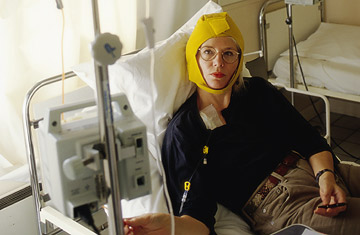
A woman covers her head to keep her warm while receiving chemotherapy for breast cancer.
Getting diagnosed with cancer is difficult enough, but choosing the right treatment from the bewildering array of options can be just as challenging. For breast cancer patients, that decision just got a little less complicated, with a new study showing that a once-popular therapy doesn't provide any additional survival benefit.
Researchers at the University of Texas M.D. Anderson Cancer Center in Houston announced at the San Antonio Breast Cancer Symposium today that high-dose chemotherapy (followed by a stem-cell transplant to rebuild the immune system) after surgery does not extend the life of breast-cancer patients. The new findings, which come after a thorough analysis of 15 trials involving 6,200 patients, should close the book on a controversial treatment that was popular during the 1980s and 1990s. At the time, doctors believed that more was better when it came to chemotherapy following cancer surgery: While it was painful for patients, oncologists thought ramping up chemo would ultimately benefit patients by destroying any cancer cells that had eluded the surgeon's knife.
Not everyone agreed with that theory, but advocates for breast-cancer patients, desperate for more and better options, pushed for access to the therapy, resulting in wrangling with some health insurers who refused to cover the treatment, saying it was too experimental. With more sophisticated cancer drugs becoming available in recent years, the demand for high-dose chemotherapy has died down, but, until now, many patients and doctors have still had questions about the usefulness of the treatment.
The multistep therapy requires doctors to extract bone-marrow stem cells from breast-cancer patients prior to surgery. After the tumor-removal operation, patients are exposed to brutal doses of chemotherapy, then re-infused with their stem cells, which restore immune cells destroyed by the chemotherapy. But ultrahigh doses of chemo are extremely toxic, and in fact, some of the 20,000 women who have received the treatment in the U.S. have died from the toxicity.
The M.D. Anderson study, led by Donald Berry, chair of biostatistics, included women with all types of breast cancer, all at the beginning stages of the disease. All had tested positive for cancer in some lymph nodes even after surgery, but none had been diagnosed with cancer that had spread any further. While women receiving the treatment enjoyed a few extra cancer-free months before relapse, they did not survive any longer than women who never underwent the rigorous therapy. "I was surprised by the results," says Berry. "I was expecting some subsets of women to show some survival benefit. Many studies had been suggesting that there were some patients, such as young patients and women with triple negative cancer" — that is, cancer cells that lack receptors for estrogen, progesterone or HER2, which makes them difficult to treat with drugs — "that would benefit. But our analysis shows that's not true."
"This report should absolutely, definitively and for all time close the door on this treatment," says Dr. Larry Norton of Memorial Sloan-Kettering Cancer Center in New York City.
Despite its negative results, Berry and Norton say the study holds a valuable lesson: that perhaps more important than the size of the dose is which chemo drug the doctor decides to use. Certain cancer cells will either respond to a drug or not — so boosting the dose, particularly of the wrong drug, is not likely to make any difference in these cases. Timing may also be key — spacing apart chemotherapy doses can increase the likelihood of catching tumor cells at their weakest. Taken together, lessons like these are making a difference where it counts most — in giving breast cancer patients the best chance at surviving their disease.
